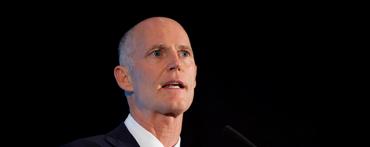
Gov. Rick Scott is diving headfirst into a debate over the U.S. Senate’s new health care plan to repeal and replace Obamacare, rubbing shoulders with national leaders as they duke out the proposal in Washington this week.
On Tuesday, the Florida governor and former health care executive met with top Republican leaders, asking them to make changes to the Senate health care bill ensuring Florida’s interests are kept in whatever measure the GOP decides on in the coming weeks.
Scott met with Senate Majority Leader Mitch McConnell and Vice President Mike Pence on Tuesday to fight for Florida’s interests in the new bill.
Scott’s primary concern: making sure Florida will not receives less money per person for Medicaid than states which expanded the program under Obamacare.
The governor announced his plan to head to Washington to make the bill Florida-friendly last week.
Speaking with Fox News Tuesday evening, Scott said something had to give if the country was going to provide affordable health care to the average American.
“This is a work in progress,” Scott said. “Obamacare is a disaster. Costs have spiraled out of control. We knew that was going to happen.”
Scott said opening up the health care market was the primary way to make health insurance palatable on Floridians’ pocketbooks.
“The only way you’re going to get costs down where people can afford their own health care is more competition and [allowing] people to buy the insurance they want to buy,” he told Fox News.
The two-term Florida governor, who is widely expected to run for U.S. Senate next year, has also pushed for giving states greater control over their Medicaid and health care options.
The current Senate GOP proposal would eliminate over $700 billion in taxes over the next decade, primarily on medical companies and on the wealthy.
Critics of the Senate proposal fear nearly $800 billion in cuts to the Medicaid program, which provides health care to families and individuals with limited resources.
According to the Congressional Budget Office analysis of the bill, Medicaid enrollment would drop by 16 percent among people under the age of 65 by 2026.
Florida is one of the few states which has refused to expand Medicaid after the Florida House objected to the expansion of an additional 800,000 people during the 2015 legislative session.
At the time, then-House Speaker Steve Crisafulli called the program “a broken system with poor health outcomes, high inflation, unseverable federal strings, and no incentive for personal responsibility.”
The Obama administration later expanded Florida’s Low Income Pool funding for an additional two years. Scott and President Donald Trump reached an agreement earlier this year to provide $1.5 billion for the program, a significant uptick from the $600 million given to cover the program in 2016-2017.
Senate leaders postponed a vote on the bill until after the Fourth of July recess due to pushback from five Republican senators who said they could not support the bill in its current form.
U.S. Sen. Marco Rubio, R-Fla. said he is undecided on whether he can support the bill, noting there are still improvements to be made.
“I don't even know if I can support it yet," Rubio said, but added he was hopeful about the future of the bill.
"The hope is that we can at least have an agreement on what we can get enough votes on this week and turn to it as soon as we come back [from recess,]” he said.
Scott may not be in the Senate -- yet -- but said although he might have reservations about some portions of the bill, he was confident what needed to be done overall.
"I don't have a vote," Scott said. "But it's very important to repeal and replace Obamacare."
Reach reporter Allison Nielsen by email at allison@sunshinestatenews.com or follow her on Twitter: @AllisonNielsen.
READ MORE FROM SUNSHINE STATE NEWS
Ileana Ros-Lehtinen Remains a Force on Foreign Policy
Carlos Curbelo, Grace Napolitano Want to Help Mental Health Research With Special Postage Stamp


